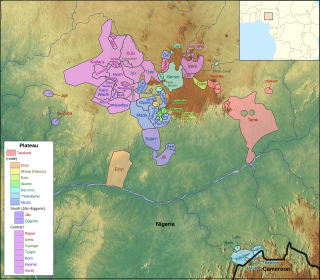Related Research Articles

The forty or so Plateau languages are a tentative group of Benue–Congo languages spoken by 15 million people on the Jos Plateau Southern Kaduna, Nassarawa State and in adjacent areas in central Nigeria.

There are over 525 native languages spoken in Nigeria. The official language of Nigeria is English, the language of former colonial British Nigeria. As reported in 2003, Nigerian English and Nigerian Pidgin were spoken as a second language by 100 million people in Nigeria. Communication in the English language is much more popular in the country's urban communities than it is in the rural areas, due to globalization.

Ngas, or Angas, is an Afro-Asiatic language spoken in Plateau State, Nigeria. Dialects are Hill Angas and Plain Angas. Retired General Yakubu Gowon is a prominent Nigerian who is of Ngas extraction.
Sha is an Afro-Asiatic language spoken in Plateau State and Kaduna State, Nigeria. As of 2018, the language is in use for face-to-face communication and has no standardized written form. The language is spoken by roughly 1000 people and is sustainable.
Zeem, or Chaari, is an endangered Chadic dialect cluster of Nigeria, whose speakers are shifting to Hausa. Dyarim is closely related.
Sanga is a Local Government Area in southern Kaduna State, Nigeria. Its headquarters is in the town of Gbantu. It has an area of 1,821 km2 and had a population of 151,485 at the 2006 census. The postal code of the area is 801.
Alumu is a Plateau language spoken by approximately 7,000 people in Nassarawa State, Nigeria. It has lost the nominal affix system characteristic of the Niger–Congo family.
Hasha, also known as Yashi, is a Plateau language of Nasarawa State Nigeria. It has an idiosyncratic system of reduplicating the first syllable of noun stems, apparently under the influence of the Chadic language Sha.
Berom or Birom is the most widely spoken Plateau language in Nigeria. The language is locally numerically important and is consistently spoken by Berom of all ages in rural areas. However, the Berom are shifting to Hausa in cities. The small Cen and Nincut dialects may be separate languages. Approximately 1 million (2010) people speak in this language.
Adara, is a Plateau language of Nigeria. The name Adara is also used to refer to the ethnic group.
Jju is the native language of the Bajju people of Kaduna State in central Nigeria. It is also locally known as "Kaje or Kache". As of 1988, there were approximately 300,000 speakers. According to Blench (2008), Jju—with more speakers—appears to be a form of Tyap.
Koro Wachi, natively Tinɔr and Myamya, is a dialect cluster of Plateau languages spoken to the north of Keffi in Nasarawa State Kagarko Local Government Area and Jema'a Local Government of southern Kaduna State in central Nigeria. Koro Wachi forms part of a larger cultural grouping with the Ashe.
Idun (Idũ), or Dũya, is a poorly attested Plateau language of Nigeria. Its classification is uncertain, but it may be closest to Ashe.
Ningye is a Plateau language of Nigeria.
Kuturmi, or Ada, is a Plateau language cluster of Kachia LGA, Kaduna State, Nigeria.
Piti is a minor Kainji language of Kaduna State, Nigeria. Bishi speakers live in at least 26 villages.
Akpondu is a Plateau language of Nigeria once spoken in Akpondu village, Kaduna State. The Akpondu people have shifted to Ninzo. Only the numerals have been recorded. The extinct undocumented languages Nigbo and Babur (Bəbər) were also spoken in nearby villages of Nigbo and Babur, respectively.
Nincut (Aboro) is a Plateau language of Kaduna State, Nigeria belonging to the Beromic branch. Blench estimates 5,000 speakers in 2003. It is spoken 7 km north of Fadan Karshe in Kaduna State. Nincut is not recorded in Ethnologue or Glottolog.
Nigbo is an extinct Plateau language of Nigeria. It was spoken near Agameti on the Fadan Karshi-Wamba road near Sanga LGA, Kaduna State. The language, listed in Blench (2012) and (2019), is not reported in Ethnologue or Glottolog. It is presumably an Alumic language based on its proximity to Akpondu, a language closely related to Alumu and Tesu.
Southern Kaduna is an area inhabited by various non-Hausa peoples, South of Zaria Emirate of Kaduna State. It is located in the Middle Belt region of Nigeria. Southern Kaduna consist of 12 local Government out of Kaduna State 23 Local Government. Some view it as being less of a geographical identity and more of an ethnic identity concept.
References
- ↑ Ahwai at Ethnologue (18th ed., 2015)
- ↑ Roger Blench: Ndunic materials
- 1 2 Blench, Roger M. 2018. Nominal affixes and number marking in the Plateau languages of Central Nigeria. In John R. Watters (ed.), East Benue-Congo: Nouns, pronouns, and verbs, 107–172. Berlin: Language Science Press. doi : 10.5281/zenodo.1314325
- ↑ Blench, Roger M. 2007. The Ndun language of Central Nigeria and its affinities.
- ↑ Blench, Roger M. 2012. Akpondu, Nigbo, Bəbər and Nisam: moribund or extinct languages of central Nigeria Babur.
- ↑ Blench, Roger M. 2006. The Nyeng language of Central Nigeria and its affinities.
- ↑ Blench, Roger. 2014. The Shakara (Tari) language of Central Nigeria and its affinities.
- ↑ Blench, Roger (2019). An Atlas of Nigerian Languages (4th ed.). Cambridge: Kay Williamson Educational Foundation.
- Blench, Roger (2008). Prospecting proto-Plateau. Manuscript.
- Ethnologue merger of Ndunic